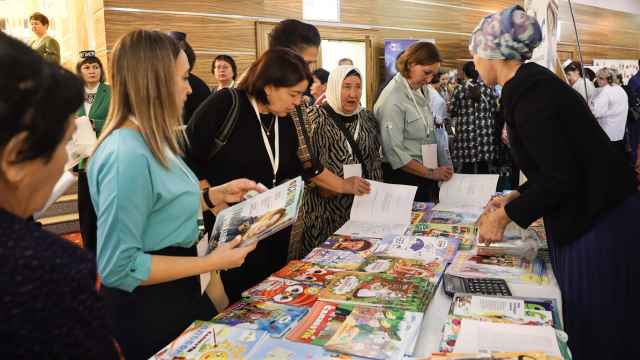The world’s largest online platform for Tatar language learners is shutting down after its Western developer chose to cease activities in Russia, ending what activists and language specialists have deemed a crucial tool for preserving the language.
Ana Tele (Tatar for “mother tongue”), had offered free lessons in Tatar, the second official language of Russia’s republic of Tatarstan, for a decade on a platform created by Sweden-based EF Education First.
“The closure was initiated by the developers. EF Education First decided to leave the Russian market,” said Alsu Mukhametova, the head of Tatarstan’s Education and Science Ministry’s press service.
“We assumed that this might be initiated by a foreign developer [at some point] and started working on [resolving] the issue with domestic specialists in advance,” Mukhametova told The Moscow Times.
Hundreds of foreign businesses have exited Russia since the start of the invasion of Ukraine last year. Last August, the Educational Testing Service (ETS), the organizer of the benchmark TOEFL English exam, closed its test centers in Russia and Belarus in response to the war.
EF English First didn’t respond to The Moscow Times’ request for comment.
Ana Tele was launched in 2013 by the government of Tatarstan in cooperation with EF English First, an international education company founded by Swedish billionaire Bertil Hult. The platform, which had Tatar, Russian and English language interfaces, offered Tatar language courses up to the upper-intermediate level.
Unlike other resources for studying Russia’s minority languages, Ana Tele offered its users the unique opportunity to combine online self-study with regular lessons with professional linguists from Kazan State University — all at no cost.
Activists and language specialists have long hailed Ana Tele as a crucial tool for preserving the Tatar language — which lost more than 1 million speakers in Russia between the 2010 and 2021 censuses — particularly after mandatory Tatar lessons were scrapped from the region’s school curriculum in 2017.
In nearly a decade of its existence, Ana Tele was used by more than 100,000 Tatar language learners both within Russia and abroad, according to statistics cited by regional news outlet Business Online.
“I have a personal relationship with Ana Tele because…I started learning Tatar on Ana Tele and I now speak Tatar well thanks to that platform,” said Kazakhstan-born Tatar language activist Marsel Ganiev, who runs a popular Telegram group for Tatar language learners.
Ganiev and other language enthusiasts launched a letter-writing campaign last week aimed at convincing Tatarstan’s education ministry to continue the program despite the exit of its foreign partner.
“This is really sad news because this project is very popular and useful for lots of people including me,” reads a sample letter posted on Ganiev’s Telegram.
“Many Tatars live in different regions and countries, for whom this portal is the only opportunity to learn their native language,” it adds.
More than 100 letters have been sent so far, some of which have reached the top echelons of the ministry, according to Ganiev.
“I hope that [after seeing] such a [large] number of letters…they will get to resolving this problem,” said the activist.
Mukhametova of Tatarstan’s education ministry told The Moscow Times that an examination by local software developers deemed Ana Tele to be an “archaic” platform and that the ministry is currently “analyzing several proposals” for a replacement.
She stopped short however of clarifying the timeline for the new language learning tool’s launch.
A Message from The Moscow Times:
Dear readers,
We are facing unprecedented challenges. Russia's Prosecutor General's Office has designated The Moscow Times as an "undesirable" organization, criminalizing our work and putting our staff at risk of prosecution. This follows our earlier unjust labeling as a "foreign agent."
These actions are direct attempts to silence independent journalism in Russia. The authorities claim our work "discredits the decisions of the Russian leadership." We see things differently: we strive to provide accurate, unbiased reporting on Russia.
We, the journalists of The Moscow Times, refuse to be silenced. But to continue our work, we need your help.
Your support, no matter how small, makes a world of difference. If you can, please support us monthly starting from just $2. It's quick to set up, and every contribution makes a significant impact.
By supporting The Moscow Times, you're defending open, independent journalism in the face of repression. Thank you for standing with us.
Remind me later.







